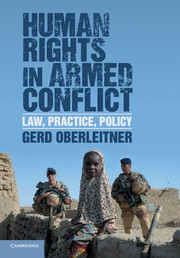Book contents
- Frontmatter
- Contents
- Acknowledgments
- Table of cases
- Table of Legal Instruments
- List of Abbreviations
- Introduction
- Part I Human rights in armed conflict: history of an idea
- 1 From medieval sources to modernity
- 2 The science of warfare and the progress of civilization
- 3 1945: whither war?
- 4 Human rights in armed conflict
- Part II Human rights and humanitarian law: theory
- Part III Human rights and humanitarian law: challenges and commonalities
- Part IV The dynamics of war and law
- Part V Enforcement: practice and potential
- Conclusion
- Bibliography
- Index
- References
1 - From medieval sources to modernity
Published online by Cambridge University Press: 05 March 2015
- Frontmatter
- Contents
- Acknowledgments
- Table of cases
- Table of Legal Instruments
- List of Abbreviations
- Introduction
- Part I Human rights in armed conflict: history of an idea
- 1 From medieval sources to modernity
- 2 The science of warfare and the progress of civilization
- 3 1945: whither war?
- 4 Human rights in armed conflict
- Part II Human rights and humanitarian law: theory
- Part III Human rights and humanitarian law: challenges and commonalities
- Part IV The dynamics of war and law
- Part V Enforcement: practice and potential
- Conclusion
- Bibliography
- Index
- References
Summary
Mercy, chivalry, self-interest and justice
Rules on how to behave in war are perhaps as old as mankind. Very few authors are so strict as to question the existence of rules on warfare prior to the first codifications in the 1860s. Quite to the contrary, prescriptions on how warriors ought to act can be found in the earliest philosophical and religious texts of African, Asian and European origin. The treatment of prisoners and the protection of the civilian population has been a concern for all of them, together with the distinction between combatants and civilians, assistance to the wounded, respect for the dead, prohibition of looting and protection of cultural property.
The rules of ancient India on warfare predate their counterparts in Western and Mediterranean cultures and elaborate rules on warfare can also be found in early and classical Greek history. Pre-colonial Africa and Latin-America knew detailed humanitarian regulations, including the prohibition of certain types of weapons, the protection of women, children and the elderly and the setting up of ad hoc tribunals on compensation after a conflict. The holy books of the main religions – the Old Testament, the Quran and the Torah – also deal with questions of warfare. The Old Testament contains a passage on feeding prisoners of war with bread and water rather than strike them dead, while Islamic provisions on warfare speak of mercy, clemency and compassion derived from divine authority, and the Islamic legal system embodies a broad set of humanitarian rules. Likewise, Deuteronomy (the fifth book of the Torah) contains rules on warfare and prohibits, for example, the destruction of trees from which the inhabitants of besieged cities gain fruits. The Buddhist tradition of humanitarian principles also had decisive influence on accentuating the humanitarian duties in warfare in ancient times in South Asia.
- Type
- Chapter
- Information
- Human Rights in Armed ConflictLaw, Practice, Policy, pp. 11 - 23Publisher: Cambridge University PressPrint publication year: 2015



